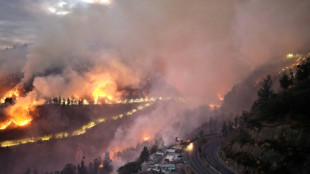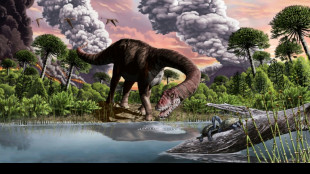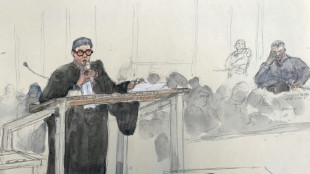
-
 High-flying Fiorentina face test of Scudetto credentials with Inter visit
High-flying Fiorentina face test of Scudetto credentials with Inter visit
-
Verstappen switches focus to re-boot defence of F1 teams' title

-
 UK filmmaker Richard Curtis makes first foray into animation
UK filmmaker Richard Curtis makes first foray into animation
-
Countrywide air alert in Ukraine due to missile threat

-
 China's military corruption crackdown explained
China's military corruption crackdown explained
-
Primark boss defends practices as budget fashion brand eyes expansion

-
 Williamson eyes ton as New Zealand take control against England
Williamson eyes ton as New Zealand take control against England
-
Norway faces WWF in court over deep sea mining

-
 Trump, Sheinbaum discuss migration in Mexico amid tariff threat
Trump, Sheinbaum discuss migration in Mexico amid tariff threat
-
Asian markets mixed after subdued pre-holiday shift on Wall St

-
 Orban's soft power shines as Hungary hosts Israeli match
Orban's soft power shines as Hungary hosts Israeli match
-
'Retaliate': Trump tariff talk spurs global jitters, preparations

-
 'Anti-woke' Americans hail death of DEI as another domino topples
'Anti-woke' Americans hail death of DEI as another domino topples
-
Trump hails migration talks with Mexico president

-
 Truckers strike accusing Wagner of driver death in Central African Republic
Truckers strike accusing Wagner of driver death in Central African Republic
-
London police say 90 victims identified in new Al-Fayed probe

-
 Air pollution from fires linked to 1.5 million deaths a year
Air pollution from fires linked to 1.5 million deaths a year
-
Latham falls for 47 as New Zealand 104-2 in first England Test

-
 US tells Ukraine to lower conscription age to 18
US tells Ukraine to lower conscription age to 18
-
Judge denies Sean Combs bail: court order

-
 Suarez extends Inter Miami stay with new deal
Suarez extends Inter Miami stay with new deal
-
Perfect Liverpool on top of Champions League, Dortmund also among winners

-
 Liverpool more 'up for it' than beaten Madrid, concedes Bellingham
Liverpool more 'up for it' than beaten Madrid, concedes Bellingham
-
Aston Villa denied late winner against Juventus

-
 Mexico president hails 'excellent' Trump talks after US tariff threat
Mexico president hails 'excellent' Trump talks after US tariff threat
-
Leicester set to appoint Van Nistelrooy - reports

-
 Coffee price heats up on tight Brazil crop fears
Coffee price heats up on tight Brazil crop fears
-
Maeda salvages Celtic draw against Club Brugge

-
 Villa denied late winner against Juventus
Villa denied late winner against Juventus
-
Dortmund beat Zagreb to climb into Champions League top four

-
 Mbappe misses penalty as Liverpool exact revenge on Real Madrid
Mbappe misses penalty as Liverpool exact revenge on Real Madrid
-
Brazil's top court takes on regulation of social media

-
 Thousands still queuing to vote after Namibia polls close
Thousands still queuing to vote after Namibia polls close
-
Trump taps retired general for key Ukraine conflict role

-
 Canadian fund drops bid for Spanish pharma firm Grifols
Canadian fund drops bid for Spanish pharma firm Grifols
-
Argentine ex-president Fernandez gives statement in corruption case

-
 Mexico says Trump tariffs would cost 400,000 US jobs
Mexico says Trump tariffs would cost 400,000 US jobs
-
Car-centric Saudi to open first part of Riyadh Metro

-
 Brussels, not Paris, will decide EU-Mercosur trade deal: Lula
Brussels, not Paris, will decide EU-Mercosur trade deal: Lula
-
Faeces, vomit offer clues to how dinosaurs rose to rule Earth

-
 Ruby slippers from 'The Wizard of Oz' up for auction
Ruby slippers from 'The Wizard of Oz' up for auction
-
Spain factory explosion kills three, injures seven

-
 US Fed's favored inflation gauge ticks up in October
US Fed's favored inflation gauge ticks up in October
-
Defence lawyers plead to judges in French mass rape trial

-
 US says China releases three 'wrongfully detained' Americans
US says China releases three 'wrongfully detained' Americans
-
New clashes in Mozambique as two reported killed

-
 Romania officials to meet over 'cyber risks' to elections
Romania officials to meet over 'cyber risks' to elections
-
Chelsea visit next stop in Heidenheim's 'unthinkable' rise

-
 Former England prop Marler announces retirement from rugby
Former England prop Marler announces retirement from rugby
-
Kumara gives Sri Lanka edge on rain-hit day against South Africa


Shadow of 'Bloody January' unrest stalks Kazakhstan
Red plastic embellishes the canvas of painter Saule Suleimenova, depicting the starting point of the lethal unrest that shook Kazakhstan at the beginning of the year.
The dark, brooding wall-sized piece shows the main square of the Central Asian country's largest city, Almaty, with its distinctive Soviet-era buildings and independence-era monument celebrating Kazakh statehood.
With her distinctive "cellophane painting" technique, Suleimenova sought to capture a violent moment in Kazakhstan's modern history that remains full of unanswered questions six months on.
The republic's winter of discontent began with peaceful protests over a hike in fuel prices before descending into chaos, leaving 238 people dead and becoming known as "Bloody January".
Government critics say the authorities' handling of the protests was full of abuses.
The state, meanwhile, insists that the country witnessed a terrorist-led coup attempt in January -- a narrative that has been met with widespread scepticism.
Painter Suleimenova has tried to convey the sense of injustice surrounding the events in her work.
She said her motivation to convey a collective mood during January grew stronger after Russia -- which sent troops to Kazakhstan to help bolster a regime in disarray -- invaded Ukraine the following month.
"With the colour (red), I wanted to express the condition we have been living through this year," she told AFP at an exhibition of her work in Almaty.
- Stripped and beaten -
Metal worker Akylzhan Kiysimbayev -- who was wounded during the events in January -- was still on crutches when AFP spoke to him.
He thought little about politics before he found himself on the sidelines of a fierce clash between police and protesters.
Now, he faces up to eight years in prison if convicted in taking part in mass disorder.
Kiysimbayev said he was guarding a property that his company was renovating on January 5 when stray bullets pierced the building's windows.
He was shot in the leg as he attempted to escape. While he was still recovering from an operation in hospital, police arrested him and beat him in the hospital corridors.
Thrown into jail, he was stripped of his clothes and beaten again, he said.
"They hit us in the places where our injuries were," he told AFP.
"They told us: you are terrorists, you are Wahabbists!"
He was forced to appear in front of a judge wearing nothing but his underwear.
Public uproar ensured that some detainees, Kiysimbayev among them, were released from pre-trial detention.
Authorities acknowledge some incidents of torture -- including several leading to death -- but there has been little progress in more than 240 investigations into the abuses.
None of the officers who Kiysimbayev says tortured him have been charged with any offence.
President Kassym-Jomart Tokayev, meanwhile, has tried to move on from the events that shook his rule, pledging a "New Kazakhstan".
Last month, his government passed constitutional changes that appeared to bring to an end the influence of his 82-year-old predecessor Nursultan Nazarbayev, who dominated the country's politics for 30 years -- a key demand in the January protests.
But Moscow's invasion of Ukraine brought newfound uncertainty for Tokayev, whose position was strengthened after the Kremlin agreed to send forces to Kazakhstan to help quell the unrest.
- 'Toxic partner' -
Russian President Vladimir Putin's decision to launch a full-scale assault on Ukraine on February 24 came just over a month after a Moscow-led security bloc intervened in Kazakhstan.
Since then, Kazakhstan's neutral stance on the conflict has angered the Kremlin.
Although Tokayev partly owes his survival to Moscow, the war in Ukraine "changed the format of relations", political analyst Dosym Satpayev told AFP.
The war itself, he said, divided opinion in Kazakhstan -- an ethnically diverse country with a large Slavic minority concentrated near Russia's border.
"Tokayev understands Russia is a toxic partner," he said.
Fresh tensions in the partnership were epitomised by an awkward exchange between Tokayev and Putin in June, in which the Kazakh leader publicly disagreed with the Kremlin chief over Ukraine.
Sitting next to Putin in Saint Petersburg, Tokayev said Kazakhstan would not recognise "quasi-state territories" like eastern Ukraine's rebel republics, as Russia has.
Kazakhstan's foreign ministry even pledged to blacklist Russian public figure Tigran Keosayan, who branded its leadership ungrateful and threatened Kazakhstan with a Ukraine-style invasion.
Ruslan Rafikov, an artist who sported a pro-Ukrainian T-shirt at Suleimenova's exhibition, told AFP that he thought the unrest in January could be repeated if authorities failed to improve living standards and ease political repression.
"The activism of citizens has not gone anywhere," said Rafikov at the event coinciding with former leader Nazarbayev's birthday.
"To the contrary, it is getting stronger."
F.Pavlenko--BTB

